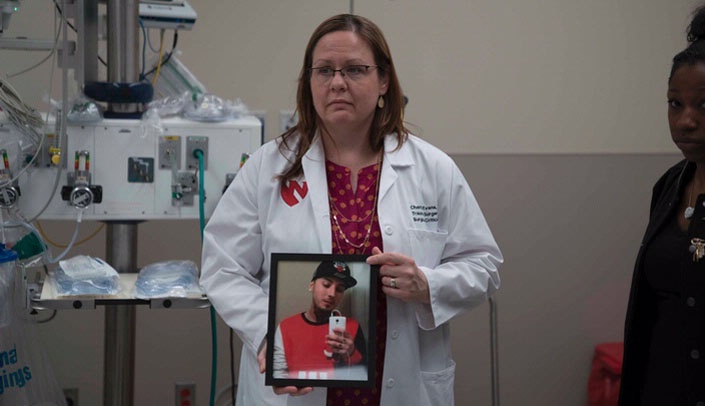Dusk to Dawn, the only hospital-based, youth violence prevention program in Omaha, has been awarded a three-year, $315,000 Clinical Scholars grant from the Robert Wood Johnson Foundation (RWJF) for its innovative program for at-risk youth.
Under the free program which was launched in May 2017, UNMC/Nebraska Medicine bring in 12-15 at-risk youth once a month for a two-hour, 30-minute class. The youth are junior and senior high students between the ages of 13 and 19 who are considered to be at risk for violence.
Clinical Scholars is a national leadership program supported by the RWJF to prepare and support small teams of clinicians, from a range of disciplines, to lead transformative change in their communities.
Selected through a competitive process, Clinical Scholar fellows receive funding to support their participation, as well as professional coaching, mentoring, networking, and an advanced curriculum.
The Dusk to Dawn program (or D2D for short) is one of only 10 programs across the nation to be awarded a Clinical Scholars grant. The D2D team at UNMC/Nebraska Medicine includes:
- Charity Evans, M.D., assistant professor, UNMC, Department of Surgery-Division of General Surgery and director of D2D;
- Ashley Emmel, trauma outreach coordinator at Nebraska Medicine; and
- Jennifer Burt, Ph.D., psychologist at the Munroe-Meyer Institute at UNMC.
“This grant allows us to grow D2D’s referral network and offer the program not only at Nebraska Medicine, but also at the youth detention center, juvenile probation and the jail,” Dr. Evans said.
She said the RWJF will expand the curriculum from its original two-and-a-half hour, once a month format to an eight-week program, allowing presenters to spend more time with youth discussing those risk factors that might lead to decisions that could put their lives at risk.
The program is built on an evidence based anti-gang curriculum and was created in partnership with its community partners, including the Omaha Police Department, the Boys & Girls Club of the Midlands and YouTurn.
Acknowledging the important role families play, Dr. Evans said work already has begun to start a parent’s group in which families will be given shared lesson plans and recommendations for supporting their child in the program.
The group also plans to institute a hospital-based violence intervention program at Nebraska Medicine. This hospital-based program will include a case manager, social worker with substance abuse counseling experience, and trauma psychologist.
“Their focus will be on assisting trauma patients as they rebuild their lives,” Dr. Evans said.
Using a trauma-informed care approach, the hospital-based violence intervention program intends to prevent injured patients from becoming victims of violence again, she said.
